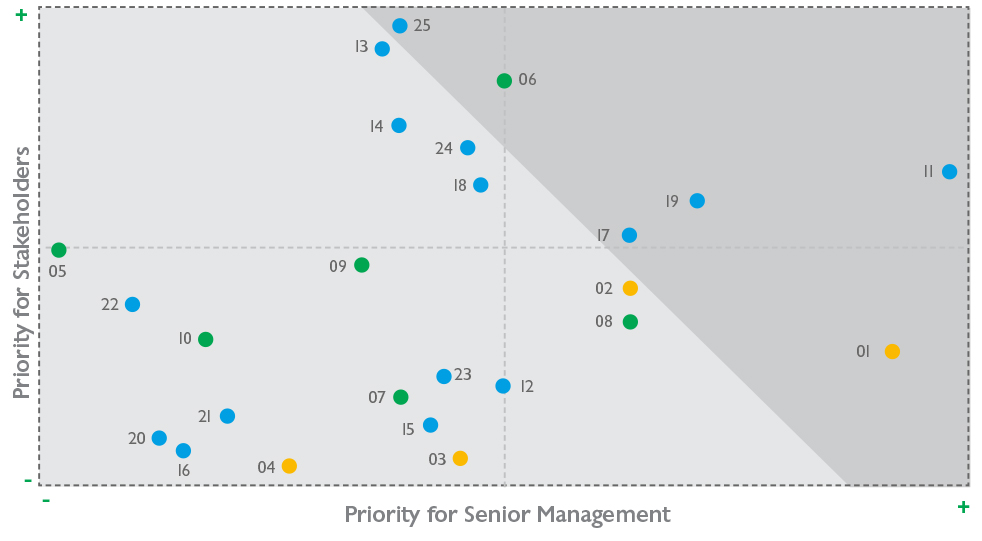Sustainability Report
About the Report
GRI 102-3, 102-45, 102-50, 102-51, 102-52, 102-53, 102-54, 102-56
We disclose our Sustainability Report for the 13th consecutive year. The 2018 edition of the Sustainability Report contains information about Algar Telecom and its subsidiaries, relating to governance, strategy and performance. This document has been prepared on the basis of the guidelines of the GRI standards, under the option “Essential” report, from the Global Reporting Initiative (GRI). This methodology ensures the materiality, transparency and comparability of the report.
You will find details of our key challenges and accomplishments during the period from January 1 to December 31, 2018. When applicable, the indicators are shown with a historical reference to the previous four years to enable a comparison of the results between different periods. Throughout the report, we present correlations between actions promoted by Algar Telecom and the global sustainable development goals established by the Sustainable Development Goals. The relationship between the initiatives and the SDGs is indicated with the logo of the goal met, the details of the initiative and the presentation of objective evidence.
The financial information included is based on the IFRS (International Financial Reporting Standards), and has been audited by E&Y. The social and environmental performance indicators were calculated and confirmed internally and have not been subject to external verification.
The report is available on Algar Telecom’s website. We encourage readers to send us suggestions, criticisms and comments on the content and format of the report. For more information about this publication, please contact the Company’s Investor Relations department:
[email protected]
(34) 3256-2978
Rua José Alves Garcia, 415 – Bairro Brasil – Uberlândia-MG (headquarters of Algar Telecom)
How did we select the topics for the report?
GRI 102-46, 103-1, 102-48, 102-49, 102-40, 102-42, 102-43, 102-44
The topics covered in this report were selected from a materiality matrix based on a survey of our strategic stakeholders, held in 2016. At the time, we researched the most important items about the company published in the media (newspapers, websites, blogs, forums and social networks) and compared the reports of other companies (in the sector, selecting those that are benchmarks in sustainability reports).
From a list of 25 topics, and arranged discussion forums and quantitative surveys of employees, customers, suppliers, creditors and entities representing the community, which are the parties with the closest relationship to the company and which, therefore, are aware of the issues that have the most impact on our business and on our relationship with society and with the environment. Internally, we performed the same evaluation with the Company’s senior management.
This analysis enabled us to select the six topics considered to be of most significance for Algar Telecom in the eyes of its stakeholders – see the graphic representation below in the relevance matrix.
Materiality matrix
GRI 102-47
To interpret the matrix, observe that there are three different colors, which represent three categories of topic: social (blue icon), environmental (green) and economic (orange). On the horizontal axis you can see the rating of topics in the assessment of senior management, while the vertical axis shows the views of the other stakeholders we consulted. As the matrix shows, social issues predominated.
The figures with icons beside them refer to the topics listed in the survey. The quadrants on the right contain the six most important topics in the view of the Company and its strategic stakeholders, and so these are the ones given priority for inclusion in the report.

| ECONOMIC TOPICS | 1. Economic performance 2. Market presence 3. Indirect economic impacts 4. Procurement practices |
| ENVIRONMENTAL TOPICS | 5. Use of materials and recycling 6. Energy consumption 7. Management of and impact on biodiversity 8. Greenhouse gas (GHG) emissions 9. Electronic waste 10. Environmental impact of use of products and packaging |
| SOCIAL TOPICS | 11. Compliance with laws and regulations 12. Management of labor relations 13. Combating child labor 14. Training and education 15. Complaint mechanisms related to impact on society 16. Communications and marketing 17. Compliance with laws and regulations on products and services 18. Occupational health and safety 19. Customer privacy 20. Assessment of labor practices of suppliers 21. Management of customer health and safety 22. Protection of children and adolescents 23. Access to telecommunication products and services 24. Non-discrimination 25. Anti-corruption |
 Share
Share